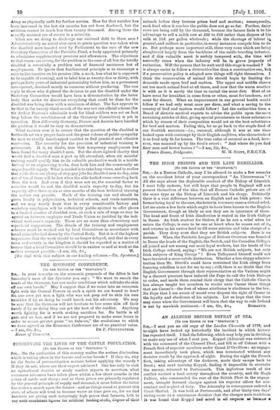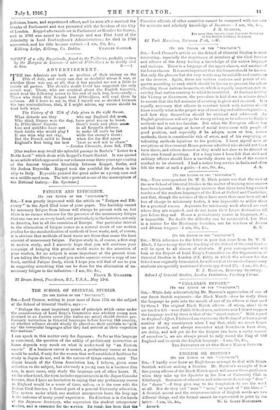AN ALLEGED BRITISH DEFEAT AT SEA.
[TO THR EDITOR OF THE " SPECTATOR-1 Snt,—I sent you an old copy of the London Chronicle of 1779, and to-night have looked up historically the incident in which history has repeated itself. I find the following, which may help you in deciding to make any use of what I sent you. Keppel (Admiral) was entrusted with the command of the Channel Fleet, and fell in off Ushaaat with a French fleet of superior numbers under Count D'Orvilliers : an engage. merit immediately took place, which was terminated without any decisive result by the approach of night. During the night the French fleet, taking advantage of the darkness, made their escape back to Brest ; and next morning Keppel, finding it impossible to overtake the enemy, returned to Portsmouth. This inglorious result of the conflict excited a loud outcry throughout the country, and Sir Hugh Palliser, who commanded the rear of the British Fleet in the engage ment, brought forward charges against his superior officer for mis- conduct and neglect of duty. The Admiralty in consequence ordered a Court-Martial. It was held at Portsmouth, and after thirty-two days' sitting came to a unanimous decision that the charges were malicious. It was found that Keppel had acted in all respects as became a
judicious, brave, and experienced officer, and he soon after received the thanks of Parliament and was presented with the freedom of the City of London. Keppel afterwards sat in Parliament as Member for Surrey, and in 1782 was raised to the Peerage and was First Lord of the Admiralty in Lord Rockingham'. Administration ; he died in 1788 unmarried, and his title became extinct.—I am, Sir, &c.,
Killiney Lodge, Killiney, Co. Dublin. CHARLES GAMBLE.
"(COPY of a silly Pasquinade, found in the rutile, ies, probably written by the Marquis de Lourois—I advi,ed D'Orvill;ers to be doubly civil to him. s____) ADVERTISEMENT.
THE two Admirals are both so positive of their victory on the 27th of July, and every one else so doubtful whose it was, or whether there was any at all, that it has puzzled mo not a little to satisfy all parties. The Jesuit's double Creed has suggested the only secure way. Those, who are sceptical about the English Gazettes, must read tho following verses to the end of each line, horizontally— Three who think that Koppel boat D'Orvilliers, will read thorn by columns. All I have to say is, that I myself am so divided between the two contradictions, that, if I might advise, may verses should be read both ways.
The Victory of th 27th of July given to the right Owner.
What dotards are they who say England did most, Who think France won the day, have groat reason to boast.
In D'Orvilliers' Gazette there's truth and plain sense.
Lies and quibbles have met in all Keppel's defence. Such tricks who would play ? to make off can't be fair If one wins why not stay, while the enemy's there : But the French saird to Brest when the foe fled apace England's fleet being the best 'twas as well not to chace."
—London Chronicle, June 3rd, 1779.
[Our readers may recall the splendid passage in Burke's "Letter to a Noble Lord" which deals with Koppel's Court-Martial. It was quoted in an article which appeared in our columns some three years ago treating of the famous tripartite friendship between Koppel, Burke, and Sir Joshua Reynolds. Koppel took the youthful Sir Joshua in his ship to Italy. Reynolds painted the great sailor as a young man and as a middle-aged man. The lattsr portrait is one of the masterpiece, of the National Gallery.—En. Spectator.]











































 Previous page
Previous page